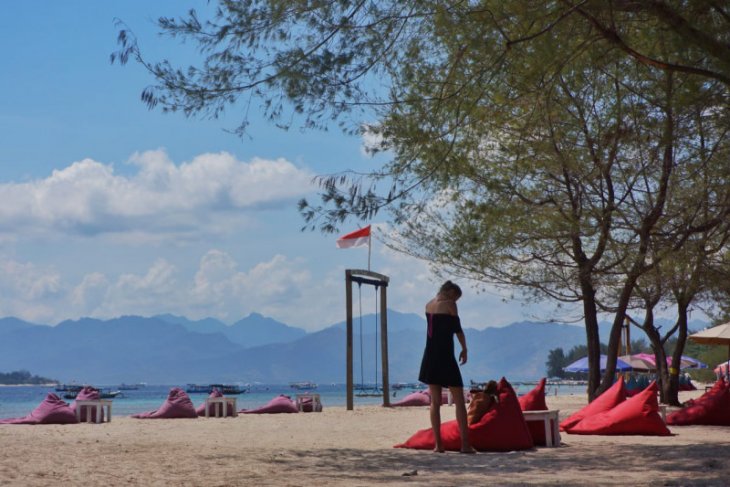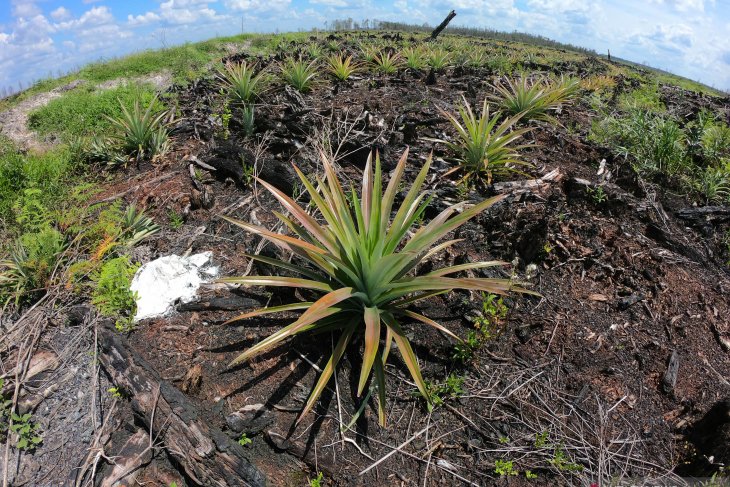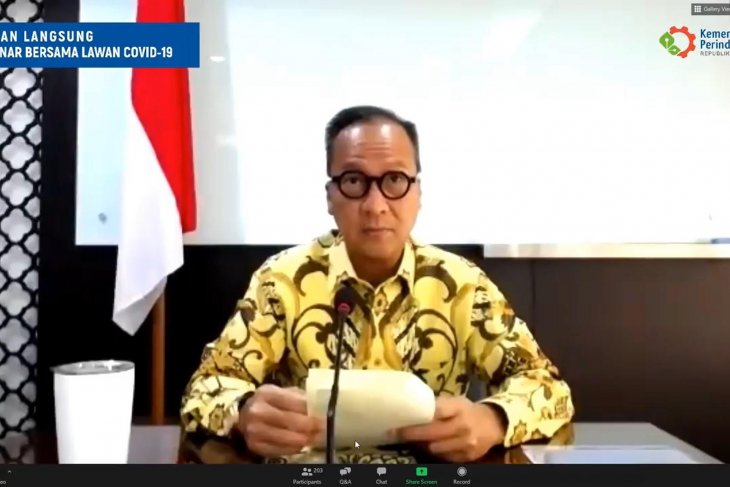Live Streaming
Program Highlight
Company Profile

Ani Hasanah
Indonesia harbors hopes of a transparent investigation by China’s authorities in cases of alleged violence and human trafficking experienced by Indonesian crew members on Chinese-flagged fishing boats.
The cases involving dozens of Indonesian crew members (ABK WNI) are under investigation by the Indonesian Police’s Criminal Investigation Department (Bareskrim) in collaboration with the Chinese authorities.
"Indonesia is upbeat about a fair and transparent resolution to investigation into cases by the Chinese authorities," Foreign Minister Marsudi stated during an online press conference from the Presidential Palace in Jakarta on Thursday.
The first case pertained to a video of a sea burial of an Indonesian seafarer's remains on a China-flagged fishing vessel.
Later, news came to light of 46 Indonesian crew members enduring violence and ill-treatment while working aboard four Chinese ships: Long Xing 629, Long Xing 605, Long Xing 606, and Tian Yu 8.
Four Indonesian crew members too had died. Three of them had died on the boats, and their bodies were buried at sea, while another crew member had died of illness in South Korea.
Most of the surviving crew members were repatriated to Indonesia, while two Indonesian crew members of the Tian Yu 8 boat were detained in South Korea, pending completion of the immigration process, and then returned to Indonesia on June 9.
"Both crew members had undergone valid PCR tests and secured health permits from the Soekarno-Hatta Airport," Foreign Minister Marsudi stated.
In the meantime, two Indonesian crew members of a China-flagged fishing boat Fu Lu Qing Yuan Yu 901 jumped off it into the Malacca Strait waters after entering Indonesia's territorial waters. They were later rescued by the local fishermen.
"While working aboard the boat, they had experienced violence and had little rest and food. Hence, they could not endure it any longer," Senior Commissioner G. R. Gultom, director of the Riau Islands Province water patrol police, stated on June 6, 2020. (ANTARA)
June

Illustration - A tourist spot in Gili Trawangan, North Lombok DIstrict, West Nusa Tenggara. ANTARA/Dhimas BP
West Nusa Tenggara will reopen tourist destinations in Lombok’s three small island triplets -- Gili Trawangan, Gili Air, and Gili Meno -- that can serve as a model of reopened tourism attractions applying health protocols.
"The province will reopen tourist destinations in the three Gilis to serve as a model of tourism attractions that implement health protocols to prevent COVID-19 transmission," head of the province’s Tourism Office H. Lalu Moh Faozal remarked in Mataram, West Nusa Tenggara province, on Friday.
The spread of the novel coronavirus disease (COVID-19) has decimated the tourism sector, thereby leading to the closure of tourism-related industries, such as hotels, in the region, he noted.
The reopening of the small islands triplets -- gili that means small island in local language -- is aimed at reviving the province's tourism industry and economy.
"We will continue to edify the public to improve their awareness to apply new normal standard procedures in their activities," he remarked.
The province' tourism office has worked jointly with the health office to formulate the standard procedure for tourism operations based on cleanliness, health, and safety (CHS).
The provincial government has also coordinated with the Lombok district administration to monitor the movement of tourists in the three islands and ensure the application of stringent health protocols in all hotels, restaurants, and tourist spots.
"These islands will be the first tourist destination to be reopened in NTB," he pointed out.
The three Gilis are a popular destination for tourists, especially for scuba diving and free diving in and around the islands, with prolific marine life and scenic coral formations.
Earlier last week, the Ministry of Maritime Affairs and Fisheries (KKP) had expressed readiness to facilitate the recovery of the marine tourism industry in Gili Matra, North Lombok District, West Nusa Tenggara, following a plan on the implementation of the new normal amid the COVID-19 pandemic.
Gili Matra, spanning an area of 2,954 ha, is a national water conservation area currently being managed by KKP's Kupang National Water Conservation Office (BKKPN).
In addition to the health protocols, the Gili Matra tourism industry must follow the new normal tourism protocols on environmental preservation.(ANTARA)
June

A view of a peatland area in Jambi, Sumatra Island. ANTARA FOTO/Wahdi Septiawan/aww
Germany, through the Deutsche Gesellschaft für Internationale Zusammenarbeit (GIZ) GmbH, allocated a three-million euro grant for peat protection and management in North Kalimantan (Kaltara), conducted jointly with the Environmental Affairs and Forestry (KLHK) Ministry.
The ministry's Directorate of Peat Damage Control with GIZ here on Tuesday (June 9) spoke of the Implementation Agreement of the PROPEAT Project for the protection and management of peat ecosystems in Kaltara.
Indonesia expressed gratitude to the German Government for support to expedite the implementation of protection and management of peat ecosystems in Indonesia, Sigit Reliantoro, secretary of the ministry's Directorate General of Environmental Pollution and Damage Control (PPKL), noted in a written statement received in Jakarta on Thursday.
"This cooperation is expected to offer an opportunity for Indonesia, which is on the forefront in the protection of sustainable peat ecosystems, to provide experience and training in Indonesia to other countries having tropical peatlands, such as the Democratic Republic of Congo and the Republic of Congo," Reliantoro noted.
Implementation of the PROPEAT project is part of the collaboration between the governments of Indonesia and Germany in the protection and management of peat ecosystems.
"The project is being implemented to manage the land in a more ecological manner for a sustainable peat and wetland ecosystem," he noted.
The project also encompasses plans to implement five social forestry programs on peatlands in North Kalimantan and strengthen three forestry institutions, including the Forest Management Unit (KPH), in implementing gender mainstreaming guidelines during the process of planning and implementing sustainable and integrated peatland land use.
Some 60 percent of the budget will be channeled for field implementation activities, while 40 percent will be spent to cover administration or overhead costs. December 2021 is the deadline set for completing the activities.
GIZ Country Director for Indonesia, ASEAN, and Timor Leste Martin Hansen noted that the cooperation between Indonesia and Germany has been ongoing for some four decades, and Indonesia is a vital partner for Germany, including in the area of environment and forestry.
Cooperation for peat preservation is crucial not only for Indonesia but also for the world, and hence, Germany strongly supports it, according to Hansen. (ANTARA)
June
Government's Incentives for Industrial Sector Redied for COVID-19 Pandemic
 Minister of Industry Agus Gumiwang Kartasasmita
Minister of Industry Agus Gumiwang Kartasasmita
The Indonesian government is readying additional incentives for the industrial sector grappling with the COVID-19 pandemic to inject new momentum into businesses.
Consequently, it can help drive the wheels of the national economy though adhering to health protocols.
"The government is currently intensively discussing various additional incentives required to revive the industrial sector," Minister of Industry Agus Gumiwang Kartasasmita noted in a statement in Jakarta on Thursday.
Kartasasmita remarked that the additional incentives comprised waiving off payments or electricity subsidies for industries impacted by the COVID-19 pandemic.
To this end, the minister has sent out a circular to state-owned electricity company PLN.
The proposal is in the form of abolishing the minimum cost for 40 hours of electricity consumption, including for premium industrial customers consuming 233 hours of electricity. This policy is proposed for the subscription period from April 1 to December 31, 2020.
"The industry is expected to pay according to the amount of electricity consumed. The amount of stimulus required is Rp1.85 trillion for a period of nine months," he revealed.
Another incentive is in the form of postponing payment of 50 percent of PLN's bills for six months, starting April-September 2020, with guaranteed installments in the form of backward demand deposits for 12 months. The other proposed incentive was removal of late payment penalties.
Furthermore, Kartasasmita stated that the government was reviewing incentives in the form of eliminating value-added taxes (VAT) for local raw materials for export, postponing VAT payments for 90 days without fines, as well as the temporary release of Article 25 income tax installments.
"The government continues to maintain performance and support the productivity of industry players, including through the provision of tax incentives," he expounded.
Kartasasmita opined that industrial productivity also aimed at ensuring that the domestic community’s requirements were met.
"Providing additional tax breaks for the industrial sector will complement other incentives released earlier by the government," he stated.
Incentives launched for industry players encompass the exemption of import tax article 22, 30 percent of article 25 income tax installments, accelerated VAT refunds, and additional incentives for companies receiving bonded zone facilities and/or ease of import-export activities for handling the Covid-19 pandemic.
The minister has also suggested credit restructuring and working capital stimulus. This incentive will be offered with several criteria, including a track record of taxes and credit installments, good business prospects, employment absorption, heavy impact of Covid-19, and use of domestic raw materials.
As per Decree of the Minister of Energy and Mineral Resources No. 8 of 2020 on Determination of Users and Certain Natural Gas Prices in the Industrial Sector, the proposed point is the abolition of the minimum payment per contract and payment in accordance with the amount of usage.
"Such efforts are certainly expected to help the industry to continue to grow and help the national economy to continue to maintain a positive trend," the minister added. (ANTARA)


